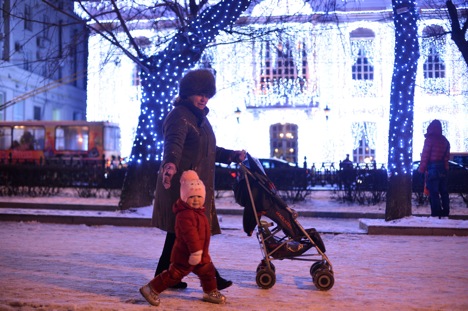
The Russian capital has become much safer over the last few years. Source: RIA Novosti / Alexey Kudenko
One of the most common and misplaced fears about Russia in the minds of foreign visitors is of violence on the streets. Thankfully, most visitors have stopped associating the country with the mafia and no longer believe that they could get shot in a crossfire on the streets, but stereotypes about xenophobic violence and streets hooligans persist.
Anyone who has visited Moscow in the last few years would easily be able to certify that the Russian capital is generally a safe place, unless of course one is drunk at 3 am and roaming around in one of the city’s distant suburbs.
As for the rest of the country, it’s hard to classify a town as safe or unsafe as local conditions vary greatly. A friend of mine compared Khabarovsk and Vladivostok with Moscow and St Petersburg respectively and said the two cities by the sea tend to be less safe than the Russian capital and the city by the Amur.
I’ve never personally encountered any problems in any of the four places but would be inclined to agree with my friend’s assessment. Even in central Russia, some cities are just better administered than others and by extension safer.
Having travelled extensively across the country, I did manage to pick up some pointers on how to feel safer in some of the dodgier places. Rule number one was having the right body language.
In a country like Japan, walking around with a non-aggressive posture and being as meek and humble-looking would endear many a local. This is something that could easily lead to an uncomfortable situation in a Russian city that doesn’t have a good reputation when it comes to street crime.
Walking with confidence and shoulders up is a surefire way of deterring a potential street-thug. Meekness is not a virtue that is appreciated by what Russians call gopniks (small-time criminals).
In the case of an unfortunate encounter, there is nothing like the power of a long conversation. On an autumn evening in the Siberian city of Irkutsk, I personally witnessed how talking things through could avoid a flare-up.
While walking on the streets with a German and two locals, we encountered two young men smoking outside a building. They were obviously in the mood for a fight and called us gays. I was willing to ignore that and walk ahead, but one Russian friend, who doesn’t exactly hold homosexuals in high esteem, fired back an insult that isn’t fit for publication. Within a minute the two managed to get reinforcements, and the four of us were surrounded by more than 10 people.
The German in our group didn’t understand Russian and was petrified, but things did not get ugly. A long discussion ensued where the blame game was traded and the conversation lasted about an hour. At the end of the talks, our “foes” shook our hands and we parted as friends. This shocked the German who was sure that we were going to get badly bruised after a fight.
Talking has a magical way of getting one out of trouble in the country, and this isn’t just with hooligans. When I was a student in Russia, I went home for a small vacation and forgot to take my university identification card with me.
When I came back to the country, the immigration officer at the airport saw my student visa and asked for the very ID, which I didn’t have with me at that moment. When she asked me why, I gave her a long list of circumstances that led to me forgetting to take my card before with me before going on vacation.
She could clearly see that I was a genuine student and the long line of impatient passengers behind me made her shake her head and stamp my passport. I did continue with the monologue until she gave me my passport back. She was close to asking me to shut up and frowned throughout the whole encounter.
When it comes to safety though, those who are “visible foreigners” need to be on guard when travelling to some of the more distant parts of the country. Often in the smaller cities and towns, there is a perception that someone from abroad must be rich by default (such attitudes are widely prevalent in India as well).
On the other hand, it’s also in the smaller cities that people will be more forthcoming and helpful if the need ever arises. The same goes for the law-enforcement authorities in the regions, who are a lot less stressed out than their counterparts in Moscow.
Over the last decade, a combination of general prosperity in Russia and an active anti-alcohol campaign has made the country a whole lot safer. Common sense and normal international precautions would go a long way in staying out of harm’s way.
All rights reserved by Rossiyskaya Gazeta.
Subscribe
to our newsletter!
Get the week's best stories straight to your inbox